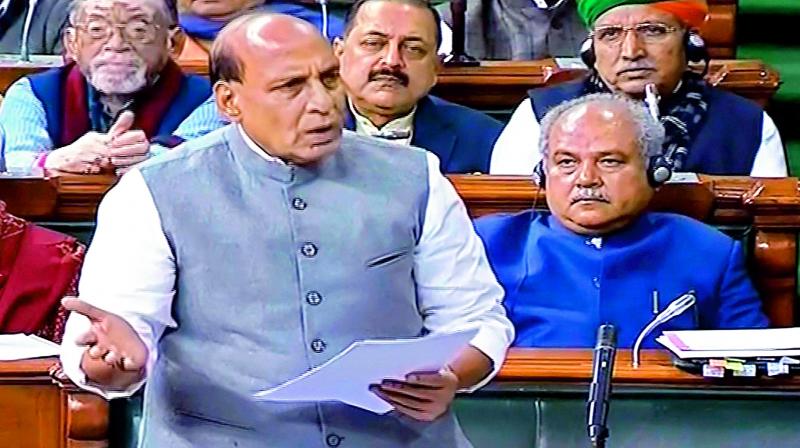Only non-Muslim immigrants to get Indian citizenship now
They have no place to go except India, says Rajnath Singh.

New Delhi: A landmark, but contentious Bill that seeks to grant Indian citizenship to non-Muslims from Bangaldesh, Pakistan and Afghanistan was passed by the Lok Sabha on Tuesday.
Piloting the Citizenship (Amendment) Bill 2019, home minister Rajnath Singh told the Opposition that the Bill was not against the provisions of the Constitution and would give succour to persecuted minorities in the three neighbouring countries.
The Bill provides for according Indian citizenship to Hindus, Jains, Christians, Sikhs, Buddhists and Parsis from Bangladesh, Pakistan and Afghanistan after six years of residence in India instead of 12 years now, even if they do not possess any document.
“They have no place to go to, except India,” he said, adding that several leaders, including Prime Minister Jawaharlal Nehru, had been in favour of giving shelter to persecuted minorities in the neighouring countries.
The Congress and several Opposition parties opposed the Bill, and they demanded the Bill be sent to a select committee.
As the government refused to heed this demand, the Congress and some others staged a walkout. Trinamul’s Saugata Roy dubbed the Bill as “divisive” and “insidious” that goes against the basic tenents of the Constitution.
“This is the worst form of votebank politics”, Mr Roy said.
While introducing the Bill, Mr Rajnath Singh clarified that the law will not be confined only to Assam but would be applicable to all states and Union territories.
This means that beneficiaries of this Bill can reside in any part of the country. The home minister said the burden of these persecuted migrants will be shared by the entire country, not just Assam.
Mr Singh said the intent of the Bill was to help minority communities from the three neighbouring countries facing discrimination and religious persecution. He said it will give relief to persecuted migrants who have entered India through its western borders to states like Gujarat, Rajasthan, Delhi, Madhya Pradesh and elsewhere.
These migrants were earlier given protection against legal action in 2015 and 2016 by giving them long-term visas. The proposed amendment will make
these persecuted migrants eligible to apply for Indian citizenship.
The home ministry said these migrants will be given citizenship only after due scrutiny and the recommendation of the district authorities and the state governments.
Mr Singh rejected the Opposition’s contention that the bill sought to discriminate on the basis of religion, and said “anyone eligible under the provisions under the law will be accorded citizenship”.

